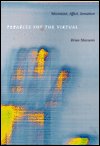 You may be wondering why I keep mentioning books by Deleuze, Guattari, and by those who've been inspired by their work. Partly this has to do with the ambit of "Differences & Repetitions." I'm also teaching a class this term called "The Problem of the Media in Deleuze & Guattari" (see my webpage under "teaching" for a more complete description), so these texts are very much on my mind. I can't help but think--and think publicly--about them.
You may be wondering why I keep mentioning books by Deleuze, Guattari, and by those who've been inspired by their work. Partly this has to do with the ambit of "Differences & Repetitions." I'm also teaching a class this term called "The Problem of the Media in Deleuze & Guattari" (see my webpage under "teaching" for a more complete description), so these texts are very much on my mind. I can't help but think--and think publicly--about them.I have to say, other than the primary works we've been reading, Brian Massumi's "Parables for the Virtual" easily is the most provocative book I've encountered in the class this term. The book's just too imaginative and broad-ranging for me to provide an adequate summary of it here. Suffice it to say that it's just one of only a handful of works that does more than "spot" Deleuzoguattarian concepts in action. In fact, what's marvelous about the book is the way in which it generates concepts all its own, building on, but moving away from, the work of D+G. This I take to be one of the primary injunctions of a deleuzoguattarian critical practice--to draw a line of flight away from their work. The other thing I'll say is how ecumenical and respectful the work is. In chapter two, for instance, Massumi really *listens* to the autobiography of Ronald Reagan, and from it he extracts concepts that would help to explain the devastating success of Reaganism. Most critics simply would dismiss the book as the meandering recollections of an aging B-grade actor.
I'm moved by a lot of what I read, but there's very little that compels me in the way that this book has. It ought to be absolutely, positively required reading for anyone at work in the humanities--or, for that matter, for anyone who wants to imagine (and enact) the possibility of more ethical ways of life.
1 comment:
Glen,
Thanks for the note. Massumi's chapter on games and events fascinated me, though I think it spun apart a bit at the end. That's no big deal, as far as I'm concerned; all it means is that it's up to us to forge even more vital connections--theoretical, empirical, etc.--across the various event-spaces he talks about.
--t
Post a Comment